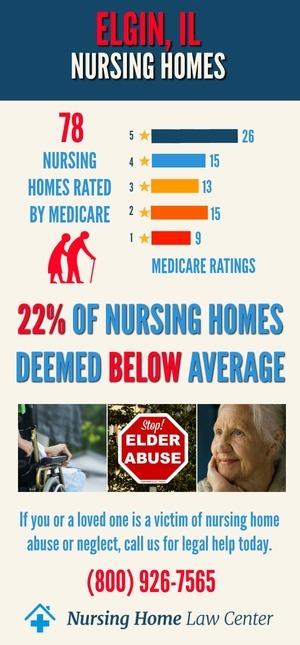The Nursing Home Law Center is committed to providing the legal resources necessary to hold negligent facilities accountable.
Elgin Nursing Home Abuse Lawyer

Licensed in Illinois
The decision to place a loved one in a nursing home or assisted living facility is never easy. Families trust these institutions to provide proper care and ensure the safety of their relatives. However, nursing home abuse is an unfortunate reality, affecting many seniors across the country.
If your family member has suffered nursing home abuse, it’s essential to seek help from an experienced Elgin nursing home abuse lawyer to protect their rights and secure justice. Legal action is a powerful tool in holding a nursing home liable and preventing further harm.
Why Hire Nursing Home Law Center
At Nursing Home Law Center, our priority is to ensure justice and secure compensation for victims of nursing home abuse. Our legal team brings extensive experience to each case, consistently achieving strong settlements and verdicts with care and sensitivity.
We perform comprehensive investigations, addressing every aspect of the abuse, from medical expenses to emotional distress and other related damages. With in-depth knowledge of nursing home abuse claims, we handle the legal process efficiently, working relentlessly to defend your rights.
Throughout your case, we provide compassionate, clear communication, ensuring you and your loved ones remain informed, supported, and confident at every stage.
Types of Cases Handled by Our Elgin Nursing Home Abuse Lawyers

Nursing home abuse occurs when a caregiver or staff member causes harm to a nursing home resident. It can manifest in various forms, and understanding the different types of abuse is critical when evaluating your legal options.
Below are the types of cases our Elgin nursing home abuse attorneys handle:
Physical Abuse
Physical abuse involves the intentional infliction of pain or harm, including hitting, slapping, or using unnecessary restraints. Residents may experience unexplained injuries like bruises or fractures, often indicating abusive behavior by caregivers or other residents.
Mental and Emotional Abuse
Emotional abuse includes verbal abuse, threats, intimidation, or isolation, which can lead to significant psychological trauma. Residents subjected to emotional mistreatment may display signs of depression, anxiety, or withdrawal from social activities.
Sexual Abuse
Sexual abuse occurs when a nursing home resident is forced or coerced into non-consensual sexual contact. Vulnerable elderly residents, especially those with cognitive impairments, are particularly at risk for this type of exploitation.
Medical Malpractice
Cases of medical malpractice include the development of bedsores, medication errors, and inadequate wound care. Errors in medical treatment can lead to severe complications or even death.
Negligence
Medical negligence is another common issue, which may involve poor hygiene, malnutrition, dehydration, or failure to provide adequate supervision. These issues can lead to other injuries, such as falls, elopement, or infections, that could have been prevented with proper care.
Financial Abuse
Financial exploitation occurs when staff or caregivers misuse or steal a resident’s money, property, or assets. This abuse can include unauthorized withdrawals from accounts, pressure to change wills, or mismanagement of a resident’s finances.
Wrongful Death
In severe cases, nursing home abuse or neglect can lead to the untimely death of a resident. If a loved one has passed away due to neglect or abuse, our attorneys can assist with filing a wrongful death claim to hold the responsible parties accountable.
Understanding Your Legal Rights
Nursing home residents have legal protections under federal and state laws.
The Nursing Home Reform Act of 1987 is a federal law that ensures residents have the right to quality care and protection from abuse and neglect. In Illinois, the Illinois Nursing Home Care Act provides additional safeguards, and the Illinois Department of Public Health monitors compliance with these regulations to maintain the well-being of residents.
In nursing home negligence or abuse cases, the victims can take legal action to seek justice and fair compensation. If they are unable to do so due to physical or mental incapacity, a family member, legal guardian, or estate representative may file a claim on their behalf.
Liability in Nursing Home Neglect and Abuse Cases
Multiple parties may be held responsible for nursing home abuse. Liability can extend beyond just the person directly involved in the abuse. Here are some examples:
- Nursing home staff, such as a nurse who fails to administer medication properly
- The nursing facilities themselves may be responsible for understaffing or inadequate staff training
- Third-party contractors, like a maintenance company that fails to fix safety hazards
- Other residents, such as one with known aggressive behavior who harms another resident
How Our Elgin Nursing Home Abuse Attorneys Can Help
Our Elgin nursing home abuse lawyers have extensive experience handling nursing home abuse cases and are dedicated to protecting the rights of nursing home residents. We offer various legal services to ensure victims receive the justice and compensation they deserve.
- Free Case Evaluation: We provide a free case evaluation to assess the details of your case and determine the best course of action.
- Case Investigation: Our team conducts thorough investigations to gather evidence of nursing home abuse, including medical records, witness statements, and facility reports.
- Filing the Claim: We will handle all aspects of filing your nursing home abuse case, ensuring that it is processed correctly and in compliance with Illinois law.
- Settlement Negotiation: We work diligently to negotiate fair settlements that cover medical expenses, pain and suffering, and other damages.
- Trial Representation: If a settlement cannot be reached, we are prepared to take the case to trial and fight for the compensation you deserve.
Common Signs of Elder Abuse Among Nursing Home Residents
In Elgin, Illinois, there are a total of 136 Medicare-approved nursing homes. Of these, 59 facilities (43%) have an overall score of below or much below average. Specifically, 52 nursing homes (38%) fall short in health inspections, and 81 facilities (60%) have inadequate staffing levels. Additionally, 30 nursing homes (22%) rated poorly in quality measures. [1]
The worst-rated nursing homes in Elgin include:
| Alden Estates of Naperville | Aperion Care Hillside |
| Bella Terra Bloomingdale | Bella Terra Morton Grove |
| Bethany Rehab & Hcc | Bria of Elmwood Park |
| Bria of Westmont | Bridgeway Senior Living |
| Crescent Care of Elgin | Downers Grove Rehab & Nursing |
| Elevate Care Niles | Elevate Care Riverwoods |
| Grove of Elmhurst, The | Grove of St Charles |
| Meadowbrook Manor – Naperville | Pearl of Elk Grove, The |
| Pearl of Elgin, The | Pearl of Hinsdale, The |
| Pearl of Hillside, The | Pearl of Naperville, The |
| Pearl of Orchard Valley | Pearl of St Charles, The |
| River View Rehab Center | South Elgin Rehab & Hcc |
| Thrive of Lake County | Tower Hill Healthcare Center |
| Wealshire Ctr of Excellence | West Chicago Terrace |
| Westmont Manor Hlth & Rhb | Zahav of Des Plaines |
Several signs could indicate a nursing home patient is being abused or neglected. These include:
- Unexplained injuries such as bruises, cuts, or fractures
- Sudden weight loss or other signs of malnutrition and dehydration
- Bedsores or infections due to poor medical care
- Emotional withdrawal or changes in behavior
- Unsanitary living conditions or poor hygiene
What to Do If You Suspect Nursing Home Abuse
If you suspect nursing home abuse, it’s essential to act quickly. Here are the steps you should take:
- Call 911 if there is immediate danger.
- Report the abuse to the nursing home administrator or management.
- File a complaint with your local Ombudsman’s office, which advocates for the rights of residents in long-term care facilities.
- Contact a nursing home abuse lawyer to explore your legal options.
Damages You Can Recover Through a Nursing Home Abuse Claim
When filing a personal injury lawsuit, victims and their families may be entitled to recover various types of damages, depending on the nature and severity of the abuse.
- Economic damages compensate for the financial losses directly caused by the abuse or neglect. Examples include medical bills, rehabilitation expenses, relocation costs, lost income, or financial support.
- Non-economic damages cover the more subjective, non-financial losses that impact the victim’s quality of life, including pain and suffering, loss of enjoyment of life, and emotional distress.
- Punitive damages are awarded in cases of particularly egregious or malicious abuse. These damages are designed to punish the responsible parties and deter similar behavior in the future.
The Cost of Hiring an Elgin Nursing Home Abuse Lawyer
At Nursing Home Law Center, we work on a contingency fee basis, which means you don’t pay unless we win your case. This arrangement allows you to seek justice without worrying about upfront legal fees.
You Have Limited Time to Take Legal Action in Elgin
Under Illinois law, the statute of limitations for filing a nursing home abuse lawsuit is generally two years from the date the abuse or neglect occurred or when it was discovered. If you suspect your loved one has suffered abuse in an Elgin nursing home, seek legal assistance immediately. A delay in filing within the legal time limit can reduce the chances of securing fair compensation.
Contact an Elgin Nursing Home Abuse Attorney Today!
If your loved one has suffered nursing home abuse, our dedicated team of Illinois nursing home lawyers at Nursing Home Law Center is here to help. We have the extensive legal expertise needed to handle your case and ensure that those responsible are held accountable.
Call us at (800) 926-7565 or fill out our contact form.
References: [1] Medicare
Illinois Nursing Home Abuse Lawyers
- Aurora Nursing Home Abuse Lawyer
- Bloomington Nursing Home Abuse Lawyer
- Champaign Nursing Home Abuse Lawyer
- Chicago Nursing Home Abuse Lawyer
- Cicero Nursing Home Abuse Lawyer
- Elgin Nursing Home Abuse Lawyer
- Joliet Nursing Home Abuse Lawyer
- Naperville Nursing Home Abuse Lawyer
- Peoria Nursing Home Abuse Lawyer
- Rockford Nursing Home Abuse Lawyer
- Schaumburg Nursing Home Abuse Lawyer
- Springfield Nursing Home Abuse Lawyer
- Waukegan Nursing Home Abuse Lawyer

